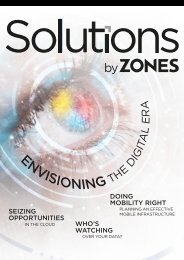SJ113 Master 2
You also want an ePaper? Increase the reach of your titles
YUMPU automatically turns print PDFs into web optimized ePapers that Google loves.
capacity of a few kilobits and went<br />
to work. Apple’s first hard drive, the<br />
ProFile offered 5MB of storage for<br />
£2,700. That’s £540 per MB. Today,<br />
you can run to your local PC World<br />
and pick up a 512GB memory card<br />
– that’s 500,000MB – for the princely<br />
sum of £330 or £0.001 per MB.<br />
The same price for performance<br />
declines hold true across the<br />
technology landscape. In 2017, we<br />
think nothing of the computing<br />
power we hold in our hands, deploy<br />
in our data centres, or access in the<br />
cloud.<br />
We can expect increasingly easy<br />
access to data that will drive change<br />
in our business and personal lives,<br />
too.<br />
Advances in miniaturisation and highspeed<br />
wireless networking mean the<br />
mobile revolution is just beginning.<br />
It’s not hard to imagine that devices<br />
the size of an Apple Watch will soon<br />
have the utility of a home office. And<br />
advances in voice recognition mean<br />
we won’t need to interact with that<br />
tiny screen, we’ll just have to speak<br />
and listen.<br />
Cybersecurity experts are embracing<br />
machine learning, as well, in a game<br />
of leapfrog that pits the black hats’<br />
algorithms against those of the good<br />
guys (see article on page 20).<br />
Big data – and the information<br />
derived from it – is yet another result<br />
of the shrinking cost and growing<br />
availability of massive computing<br />
power and storage capacity. For<br />
example, in medicine, machines can<br />
now scan and compare thousands of<br />
images to spot anomalies, leading to<br />
faster diagnoses. Police departments<br />
can use big data to identify patterns<br />
of activity and deploy resources more<br />
quickly to respond to or even deter,<br />
criminal activity. And businesses can<br />
sift through unlimited amounts of<br />
customer and sales data to identify<br />
triggers and opportunities in the<br />
marketplace.<br />
Cheap data is also driving the rapid<br />
evolution of machine learning. Every<br />
day we interact with algorithms that<br />
determine what we see online – from<br />
friend recommendations on Facebook<br />
to purchase suggestions on Amazon<br />
to the ads that pop up in almost all<br />
our browsers. These machine learning<br />
systems create models based on<br />
existing information and then make<br />
predictions and decisions based on<br />
new data. In other words, they “learn.”<br />
Transform Your<br />
IT Infrastructure<br />
Streamlined, flexible, transformative IT helps<br />
deliver the applications and workloads to<br />
make your business better. FlashStack<br />
dramatically reduces IT overhead and helps<br />
you drive business impact:<br />
Scale, upgrade, avoid downtime with<br />
stateless technology<br />
It’s likely that soon, big data, machine<br />
learning, and nanotechnology –<br />
the manipulation of individual<br />
atoms and molecules – will come<br />
together to address the subtitle<br />
of Kurzweil’s book, When Humans<br />
Transcend Biology.<br />
In the not too distant future, we can<br />
expect microscopic smart machines to<br />
help us fight disease, and allow us to<br />
experience the exponential growth of<br />
technology well into old age.<br />
Management design for the data centre<br />
and the business<br />
Promote innovation through simplified<br />
upgrades<br />
Designed around performance and<br />
reliability<br />
Simplicity, ease-of-use, and cost<br />
reducation<br />
For more information, visit<br />
www.ukzones.com














